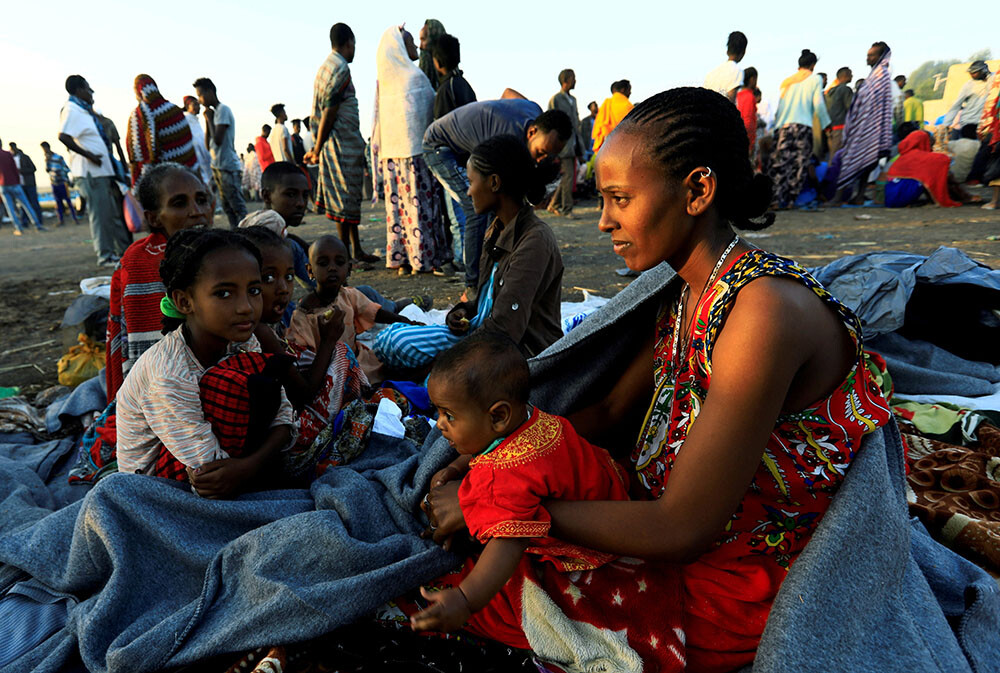By Abu Girma Moges (PhD)
The Ethiopian economy is plagued by poverty and stagnation, making it increasingly difficult to achieve and sustain balanced economic growth that would uplift the living standards of the majority. However, it is the distorted economic policies implemented by successive governments over the years that have hindered the population from realizing their potential to earn a decent living. In turn, this has pushed the economy into crisis. To escape this crisis, it is imperative to seriously consider implementing fundamental policy reforms that address the underlying economic issues.

While the initial conditions of the economy pose a challenge for initiating sustainable and inclusive economic growth, the fiscal and monetary policies, along with the overall repressive approach adopted by the government, effectively suffocate genuine private sector initiatives in productive economic activities. This, in turn, discourages entrepreneurs from embarking on job and income-generating ventures. Any limited interest shown by foreign direct investment in recent decades has practically vanished due to the deteriorating security and working environment in the country.
The economy’s capital stock is barely maintaining its level, let alone growing through savings and investment. The country is under immense pressure to meet its import bills, and its export performance has been weak and continues to deteriorate, leading to a depletion of the foreign exchange reserves.
Both the central and regional governments have miserably failed to effectively manage the economic resources and provide a conducive operational environment, resulting in an extremely challenging business environment. The combination of these factors has created a perfect storm that threatens to engulf millions of Ethiopians who lack the capacity to absorb such an economic shock.
The cumulative impact of these interrelated economic, political, security, and social factors has led to a precipitous decline in purchasing power and productivity of the economy, exacerbating an already dire situation.
Over the past five years alone, the economy has experienced a freefall, leaving economic actors desperately struggling to survive. Crucial macroeconomic data from Ethiopia’s Ministry of Planning and Development and the Ethiopian Statistics Service reveals the critical state of the national economy.

The real GDP, adjusted for purchasing power, has steadily deteriorated from an already meager USD 76.6 billion in 2016/17 to USD 48.4 billion in 2021/22. This drastic collapse has resulted in a decline in real GDP per capita from approximately USD 821 to a mere USD 465. This represents an average annual decline rate of 11.4 percent, which has shown no signs of abating.
Given the ongoing crisis in various parts of the country, it is highly unlikely that the outcome for 2022/23 will be any better than the previous five years. This paints a clear picture of an economic crisis and a catastrophic collapse to rock-bottom levels. Behind this economic depression lies the massive destruction of the capital stock and the working environment, coupled with adverse weather conditions in extensive areas of the country.
This economic collapse has also manifested in rampant inflation, which has accelerated over the past five years. The general price index has increased 3.7-fold, while the food price index has increased 4.1-fold since 2016. Meanwhile, the average household income has barely increased or, in real purchasing power terms, has even diminished.
Adding to the challenge is the rapidly growing labor force, which is unable to find employment opportunities, resulting in a sharp rise in unemployment in the economy. The rate of new job creation falls significantly short of the 2.1 million annual jobs needed to accommodate the surging labor force in the country. These detrimental circumstances highlight the level of hardship and struggle the population has to endure for mere survival. Millions of Ethiopians are forced to rely on food aid for their sustenance, while those without access to such assistance face the grim reality of starvation.
The foreign exchange earnings from the export sector barely covers the country’s imports of essential items like medicine and petroleum. The current account deficit has been growing over the years and is more and more financed through borrowing, resulting in a growing external debt burden. If the borrowed resources were efficiently and wisely used for investment in income and employment-generating projects, the debt burden could have been manageable over time.
However, that is not the case. Why haven’t the projects for which the funds were borrowed helped repay the initial borrowing? The answer is evident. The proceeds from bond offerings or borrowing were not properly utilized after a thorough due diligence and economic project appraisal.
For instance, the proceeds from the Eurobond were used to finance cosmetic and overpriced projects like a mini-railway system in Addis Ababa and an industrial park in Hawassa, both of which were contracted to Chinese companies. What remains are overpriced, underutilized, and financially unsustainable projects that contribute minimally to foreign exchange generation or the improvement of production and productivity levels in foreign exchange-generating sectors.
The system is already strained to meet its external debt service obligations, and the recent default on the USD 33 million Eurobond coupon payment, which had relatively favorable terms, is just the beginning of an impending crisis.
In terms of policy mismanagement, the pervasive and systematic practice of financial repression, where the real interest rate remains excessively negative, has effectively deprived the general public of its financial resources. Financial repression amounts to illicit confiscation of assets held by the public in nominal financial forms, and its cumulative cost could be devastating.
For a significant period of time, the Ethiopian public has lacked financial or economic motivation to hold their assets in the form of bank deposits or liquid money denominated in the local currency. Saving deposits in commercial banks has become economically unappealing due to the steady erosion of the purchasing power of the Ethiopian Birr.
While some businesses may need to hold cash for operational expenses and individuals may save for down payments or emergencies, parking financial resources in assets that offer some degree of inflation protection has become a necessary survival strategy in this challenging economic environment. Finding alternative avenues for allocating limited resources is not easy, but protecting assets from inflation has become crucial.
However, not everyone suffers from inflation and financial repression. Economic agents who have access to or can provide sufficient collateral to borrow from financial institutions benefit at the expense of the general public, who hold their savings in these institutions.
Ultimately, the government as the issuer of the currency in the system benefits from the inflationary situation at least in the short-term, as they gain access to economic resources in exchange for fiat currency. Unless monetary policy is governed by competent and independent monetary authorities, this costly and destructive process will continue.
These aspects of monetary policy practice in Ethiopia have eroded the incentive and justification for financial savings and their transformation into investable loanable funds. The economy needs to save and accumulate approximately USD 30.3 billion annually (by 2017 international dollar equivalent), or around 10.6 percent of real GDP, solely to protect the capital stock from diminishing. Such a substantial margin is necessary to cover the depreciation rate of the total productive capital stock and urgently build its capital stock further.
Removing any and all hurdles for individuals and businesses to engage in saving initiatives, and ensuring effective and coordinated efforts by financial institutions to allocate these funds for investment purposes, is of utmost importance. The stock of capital per productive worker determines the intensity of capital in the economy, as well as the growth rate of labor productivity and income.
The inflationary situation in the country has also indirectly influenced the behavior of economic agents, who view real estate as a better option for protecting their assets against inflation. However, the real estate sector itself has contributed to the inflationary pressure by driving up house prices and rental costs.
The prices of houses and land have reached unjustifiably high levels, with somewhat reasonable quality properties ranging from USD 3000 to USD 3600 per square meter in Addis Ababa. Real estate companies, particularly those targeting the diaspora community, are taking advantage of the situation and generating exorbitant profit margins. It is worth noting that the majority of construction contracts are awarded to Chinese construction companies. This overwhelming dominance of Chinese companies in the local construction sector has turned Ethiopia into a country that imports extravagant high-rise buildings, highways, and industrial parks.
The real estate sector is ripe for a significant correction and is likely to result in a colossal crisis. Many unsuspecting individuals within the diaspora community are at risk of suffering significant financial losses, while opportunistic entities are already exiting the stage.
While individuals have their own incentives and risk appetites, it is crucial for economic agents to consider alternative shock absorption options before it is too late. Otherwise, there is a high probability of being left empty-handed and losing hard-earned money on a substantial scale. The real estate and debt financing segments in the Addis Ababa market are fraught with toxicity, and inexperienced participants in the game are strongly advised to operate within their means to avoid regret and financial hardship.
In terms of fiscal policy, the willingness and capacity to effectively manage the country’s fiscal system play a crucial role in allocating and reallocating economic resources to facilitate steady, sustainable, and inclusive economic growth. However, the government’s ever-expanding appetite for spending on projects with limited impact and weak linkages to the rest of the economy, as well as internal conflicts and a repressive security regime, indicates that the revenue generated from the weak economy through taxes and non-tax sources is insufficient to finance the expenditure requirements.
This failure to prioritize limited fiscal revenue in vital areas has put immense pressure on fiscal management, making it difficult to even pay public servants their meager salaries on time. Consequently, recurrent fiscal deficits emerge, posing both short-term and long-term challenges to the national economy.
When fiscal deficits become high relative to the size of the national economy, they become burdensome and distortive, leading to either high tax obligations or the accumulation of public debt. Given the weakness of the monetary policy framework, these fiscal deficits put pressure on the money supply to grow faster than what the economy requires, exacerbating inflationary pressures.
Even though the agricultural and food production sector faces significant challenges and has become political, it plays a crucial role in the Ethiopian economy, contributing to income generation, employment, export earnings, and food security targets.
Despite having considerable arable land, the agricultural sector has suffered from distorted economic policies and neglect. One of the key challenges is the lack of investment allocated to the agricultural sector, leading to rapid deterioration in soil fertility and salinity.
Approximately 43 percent of the agricultural soil suffers from excessive salinity, and in many areas, the harvest from plots no longer covers the cost of production. Additionally, the majority of the agricultural sector is characterized by subsistence smallholder farming with low labor productivity, while the labor force engaged in the sector continues to increase.
What is more, the absence of secure land tenure deprives smallholder farmers of the ability to engage in land development, soil conservation, and investment efforts that are critical for the sector’s sustainability and ensuring food security. Addressing the challenges in the agricultural sector requires a comprehensive examination of the country’s economic policy stance.
Economic phenomena adhere to well-established economic principles, even though the rules are not necessarily precise. Economic activities are carried out within the broader political-economic framework, and addressing economic challenges necessitates correct political decision-making. Nonetheless, it is widely recognized that persistent economic challenges can lead to political crises and societal upheaval. In the context of Ethiopia, these challenges are substantial and have been growing over time. Therefore, it is crucial to administer a foundational therapy on the economic policy stance of the country to tackle both short-term and long-term issues facing the economy.
The first step is stabilizing a collapsing economic situation through monetary and fiscal policies that prioritize price stability and responsible management of public funds aligned with development priorities. The government must live within its means, and unsustainable fiscal deficit financing should be strictly mitigated.
Second, overcoming hurdles for entrepreneurs to engage in productive activities and generate employment opportunities for the growing labor force is crucial.
Third, improving governance and addressing issues of accountability, transparency, and corruption in public resource allocation, Fourth, allocating resources and providing effective policy attention to the agricultural sector should be a top priority, considering its importance in the economy.
Long-term structural policy issues, such as land tenure and security, need to be addressed promptly to prevent a crisis in the sector and the wider economy. Making farming economically viable and investable is necessary to promote labor productivity and sustainable use of agricultural resources.
While these measures may not completely eliminate the risk of an economic crisis, it is evident that persisting with the current distortive and misguided policy package, coupled with incompetence, will lead to significant economic, political, and social upheaval. It is imperative to administer a foundational economic policy therapy to address the pressing and accumulated challenges facing the Ethiopian economy.
(Abu Girma Moges (PhD) is a professor of economics at the University of Tsukuba in Japan.)


















Meanwhile, there was another earthquake near Obock, Djibouti yesterday that registered 4.4 on Richter’s scale. Earthquakes are now frequenting that part of Africa recently. 4.4 May seem small but even that can cause damage if it is under residential areas and close to the surface. I have been worried about the possibilities of bigger earthquakes under heavily inhabited areas in The Horn of Africa for quite some time now because that area is sitting on an active plate. I am not sure if all those three countries, Eritrea, Ethiopia and Djibouti have the readiness to deal with a disaster caused by such sudden disastrous calamity. I’m not sure if they even have building regulations with earthquakes in mind. One countryman who hails from Addis/Finfine had once told me there was such building regulation during the late Emperor’s time. I hope they still have it on the books. It gives me the heebie jeebies just thinking about it. Damaging earthquakes are the last thing those citizens need.